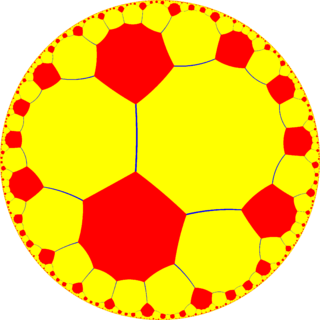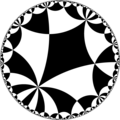Top Qs
Timeline
Chat
Perspective
Truncated order-8 hexagonal tiling
Semiregular tiling of the hyperbolic plane From Wikipedia, the free encyclopedia
Remove ads
In geometry, the truncated order-8 hexagonal tiling is a semiregular tiling of the hyperbolic plane. It has Schläfli symbol of t{6,8}.
| Truncated order-8 hexagonal tiling | |
|---|---|
 Poincaré disk model of the hyperbolic plane | |
| Type | Hyperbolic uniform tiling |
| Vertex configuration | 8.12.12 |
| Schläfli symbol | t{6,8} |
| Wythoff symbol | 2 8 | 6 |
| Coxeter diagram | |
| Symmetry group | [8,6], (*862) |
| Dual | Order-6 octakis octagonal tiling |
| Properties | Vertex-transitive |
Remove ads
Uniform colorings
This tiling can also be constructed from *664 symmetry, as t{(6,6,4)}.
Related polyhedra and tilings
Summarize
Perspective
From a Wythoff construction there are fourteen hyperbolic uniform tilings that can be based from the regular order-6 octagonal tiling.
Drawing the tiles colored as red on the original faces, yellow at the original vertices, and blue along the original edges, there are 7 forms with full [8,6] symmetry, and 7 with subsymmetry.
Symmetry
The dual of the tiling represents the fundamental domains of (*664) orbifold symmetry. From [(6,6,4)] (*664) symmetry, there are 15 small index subgroup (11 unique) by mirror removal and alternation operators. Mirrors can be removed if its branch orders are all even, and cuts neighboring branch orders in half. Removing two mirrors leaves a half-order gyration point where the removed mirrors met. In these images fundamental domains are alternately colored black and white, and mirrors exist on the boundaries between colors. The symmetry can be doubled to 862 symmetry by adding a bisecting mirror across the fundamental domains. The subgroup index-8 group, [(1+,6,1+,6,1+,4)] (332332) is the commutator subgroup of [(6,6,4)].
A large subgroup is constructed [(6,6,4*)], index 8, as (4*33) with gyration points removed, becomes (*38), and another large subgroup is constructed [(6,6*,4)], index 12, as (6*32) with gyration points removed, becomes (*(32)6).
Remove ads
See also
Wikimedia Commons has media related to Uniform tiling 8-12-12.
References
- John H. Conway, Heidi Burgiel, Chaim Goodman-Strauss, The Symmetries of Things 2008, ISBN 978-1-56881-220-5 (Chapter 19, The Hyperbolic Archimedean Tessellations)
- "Chapter 10: Regular honeycombs in hyperbolic space". The Beauty of Geometry: Twelve Essays. Dover Publications. 1999. ISBN 0-486-40919-8. LCCN 99035678.
External links
Wikiwand - on
Seamless Wikipedia browsing. On steroids.
Remove ads


























